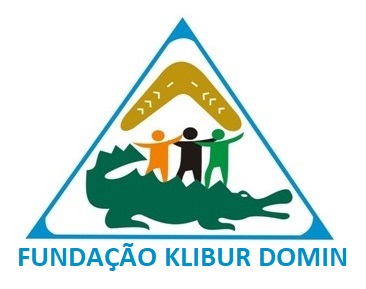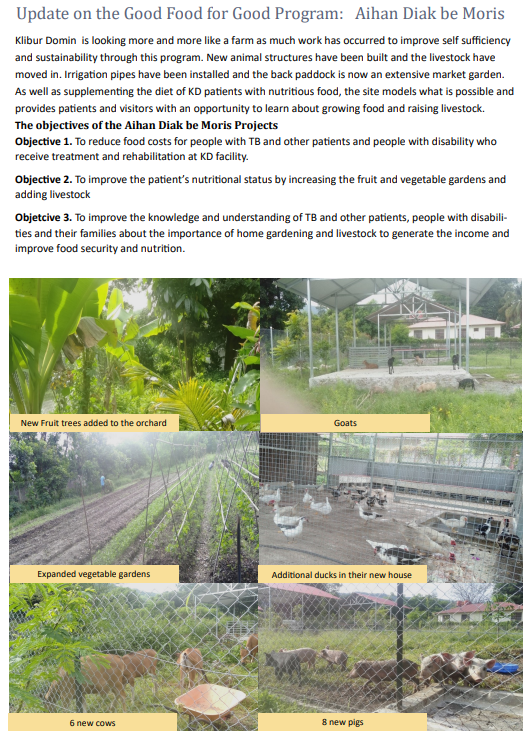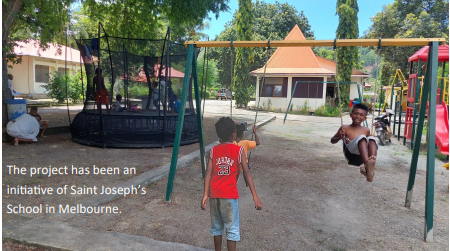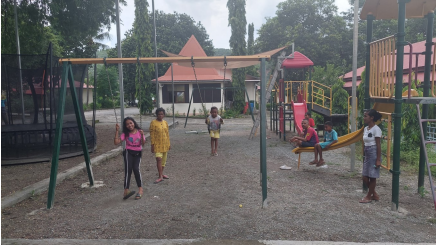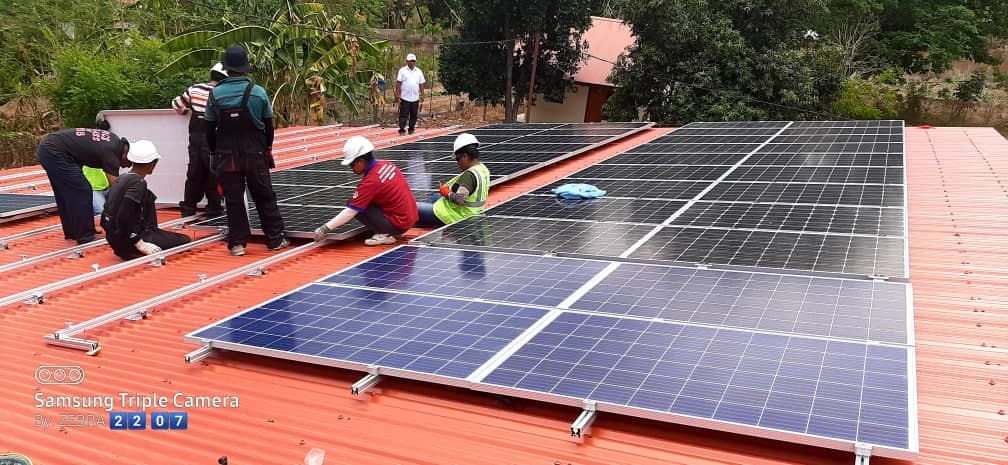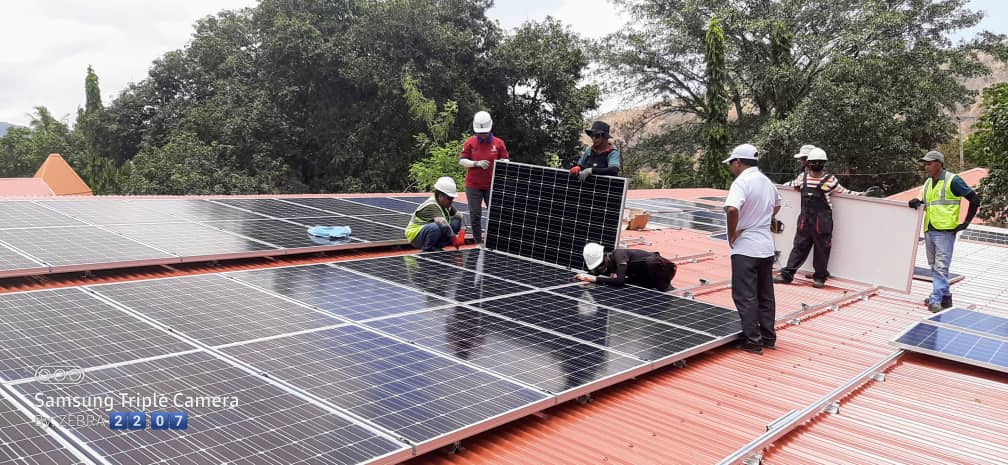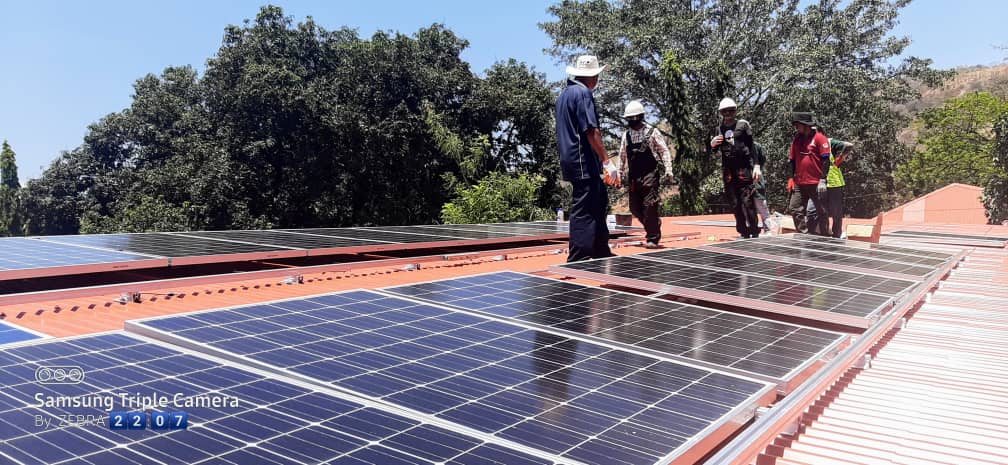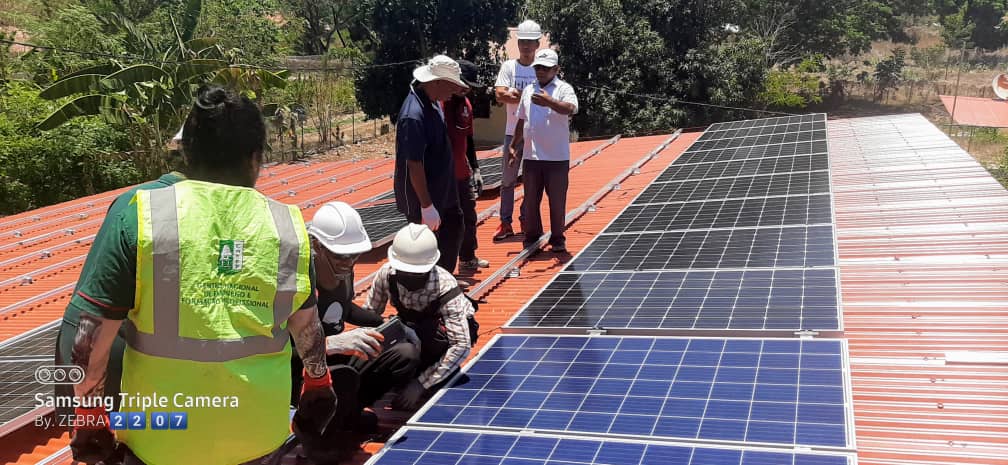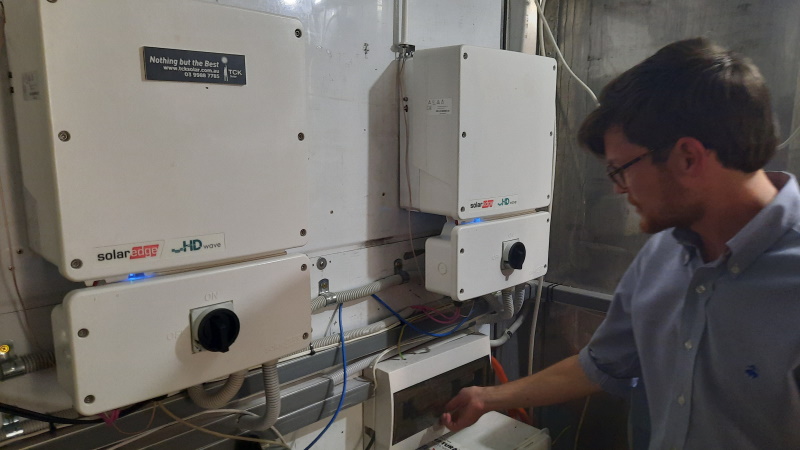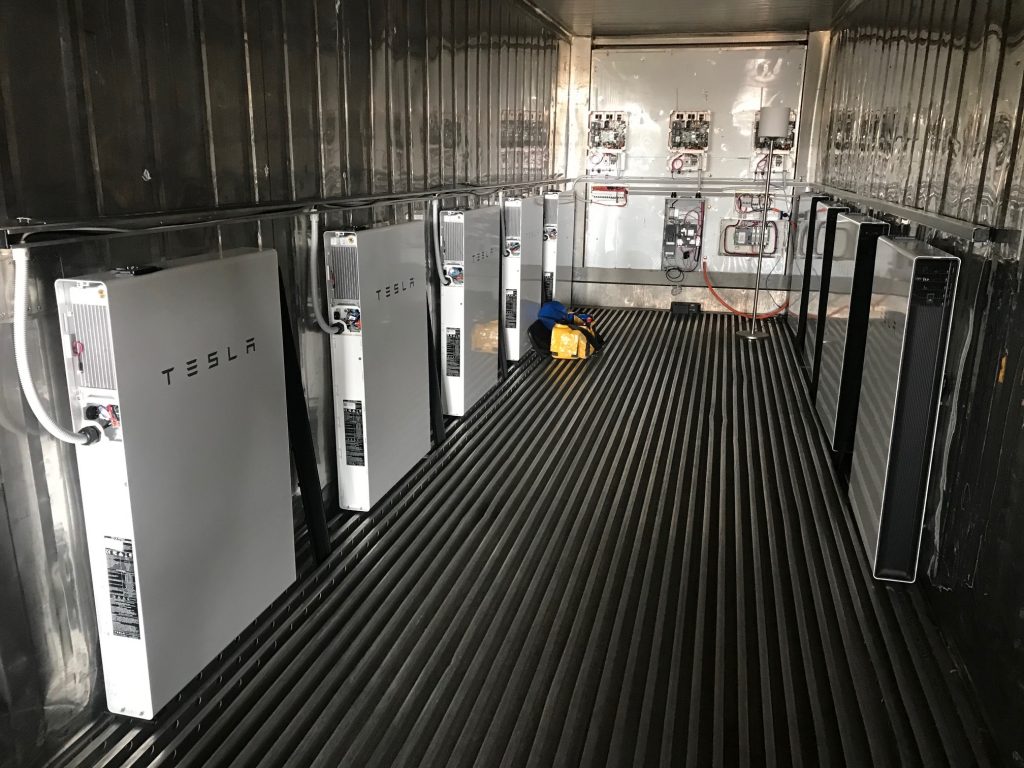TB Case detection
During 2019, Ryder-Cheshire Australia and Klibur Domin have been working with the support of Australian Aid Friendship Grants to improve the capacity of the National Tuberculosis Program in Timor-Leste. The Australian Aid Friendship Grant was implemented under the title “Diagnosis and Treatment of Tuberculosis in Timor-Leste.” The aim of the activity was to introduce a new GeneXpert Laboratory to Viqueque, an urban centre on the south East coast of the island.
The World Health Organisation has identified the molecular assay technology used by GeneXpert as the best way to diagnose TB, however the majority of TB cases in Timor-Leste currently rely on microscopes operated in laboratory settings by local technicians.. After discussions with the National Tuberculosis Program, Viqueque was identified as the priority location for the installation of a new GeneXpert laboratory, and will hopefully be one of a number of new laboratories using the technology across Timor-Leste in coming years. With the GeneXpert machine operating in Viqueque, far more accurate diagnosis of Tuberculosis is now possible. The machine has a capacity to perform 2,500 tests per year. This important investment in TB diagnosis will have a significant long-term impact on efforts to combat TB in Timor-Leste.
“The GeneXpert is running very well for our community in Viqueque Villa … our community here in Viqueque really wants your continued support.”
– Godinho Soares, District TB Assistant for Viqueque Villa Sub-District
The project engaged a broad range of people from Timorese government to local tradesmen and community members. The Timor-Leste Ministry of Health was included in project design, healthcare workers were engaged through training programs, and community members were visited door-to-door during the activities.
It is estimated that 80% of families who experience a case of TB will face catastrophic costs of loss of income and assets as a result of late diagnosis and poor treatment outcomes. The GeneXpert is a long term investment to combat this priority health risk, and will play an important part in local and national efforts to diagnose and reduce the incidence of TB to meet the 2030 Sustainable Development Goal for the end the epidemic of Tuberculosis in Timor-Leste.
Find out more about information on the Friendship Grants program
Klibur Domin expands Tuberculosis Work
In May 2020 Klibur Domin signed a new $450,000 USD cooperation agreement with the United Nations International Organisation for Migration (IOM) to continue its work in stopping the spread of TB in Timor Leste. This project is funded by the Korean International Cooperation Agency who recognised the expertise of KD teams in active case finding, contact tracing, and TB education. Klibur Domin already had a strong relationship with IOM, working together as local implementing partners for the Global Fund TB program. The IOM has subcontracted Klibur Domin to conduct activities for the KOICA project including active case finding and contact tracing, and TB education in 8 sub-districts of Timor-Leste.
These sub-districts make up all of the municipality of Baucau including the major urban area of Baucau Villa, the remote sub-district Metinaro to the north of the capital Dili and all of Atauro island.
The project includes a new remote office in Baucau because of its proximity to the main activity area with support from the TB team and KD management in Tibar. The project saw 10 new KD staff employed including a new assistant TB manager, finance officer, lab technician, driver and 6 field officers.
For the first time, the KD team will also have a mobile digital chest X-ray machine to assist with diagnosis and a new GeneXpert will be installed at the Baucau community health centre.
The partnership with the Korean International Cooperation Agency and the United Nations International Organisation for Migration marks a new chapter for Klibur Domin’s TB program and reaffirms Klibur Domin’s expertise and commitment to eradicating tuberculosis and its demonstrated positive impact on the lives of people and communities of Timor-Leste since 2000.
Australian Catholic University (ACU) Physiotherapy Student Placements
ACU has had Physiotherapy and Occupational Therapy students visit KD on placement over the years. The students gain a lot from this experience and ACU has received funding to explore other ways to support KD to offer this great experience to Australian students.
The Brisbane campus of Australian Catholic University also continues to support the disability program at Klibur Domin and nearby districts.
In particular, we have received funding for the following programs:
- Financial support for a program to support youth with disabilities to attend high school in the local area.
- Contribution to KD’s Community-Based Rehabilitation program to support community outreach for children with disabilities in rural and remote areas to promote health, wellbeing, participation, and
inclusion in the community. - Contribution to CBR program to support ‘in house’ rehabilitation program for people with disabilities attending Klibur Domin for intensive rehabilitation (including the mental health program, neuro
rehabilitation, physical rehabilitation, and pediatric rehabilitation programs) to support return to work and/or engagement in occupations. - Financial support for equipment for people with disabilities to have access to their homes and their community (e.g. fabrication of tumble form chairs for feeding; wheelchair access to homes; wheelchairs for children)
We thank ACU for also donating a Tumble Form Chair for the KD rehabilitation Centre to be used to support children with cerebral Palsy.
Covid Testing
Klibur Domin was successful in its application for an Emergency Relief Grant from a UK based foundation. The majority of the USD $100,000 grant was for a ‘blitz’ of COVID testing and tracing in the Liquisa and Ermera Districts, to support the efforts of the Ministry of Health. Apart from funding the cost of a new dedicated vehicle, the Grant covered the supply of a French made GeneXpert machine, and related software and computer, to provide rapid results from PCR samples taken from the community.
This will effectively mean that with the arrival of this new equipment, operated and administered by KD, enables the Health authorities to undertake either random or targeted sampling of all people entering Dili from the West.
Cyclone/Flood Relief
Once again thank you to all those who supported our Flood Recovery Appeal. All of the monies raised have been sent to Timor and now fully distributed.
A total of 72 families in the Tibar community have received vouchers for food and materials to repairs homes and other facilities.
Most of the rest has been spent on constructing ‘gabion cages’ which are then being positioned to protect one part of the Klibur Domin compound wall that was found to be vulnerable.
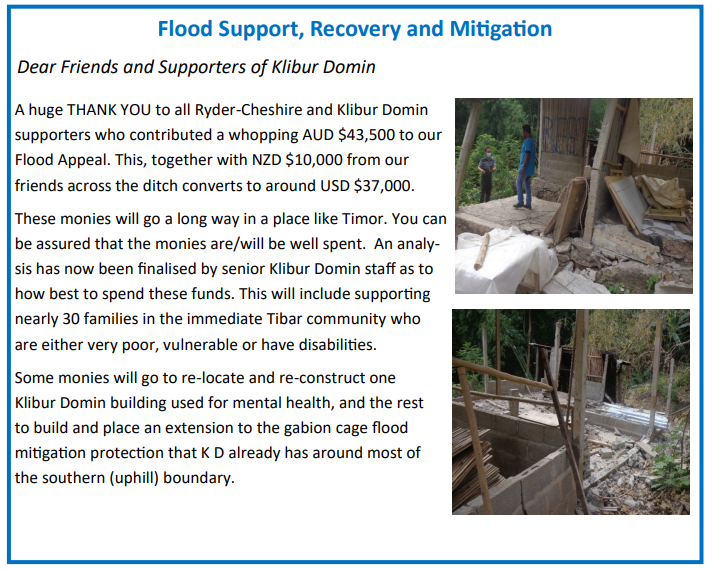
Irrigation Project
With the support of the Rotary Club of Casterton and Netafim Australia, work was undertaken to establish a drip irrigation system to assist with the growing of fruit and vegetables at Klibur Domin. This system will free up our gardeners to focus on crop development and animal husbandry. Rather than applying water with watering cans, a drip system reduces evaporation and allows timed evening watering . Staff have already installed two sections of the pipes and the system is working well.
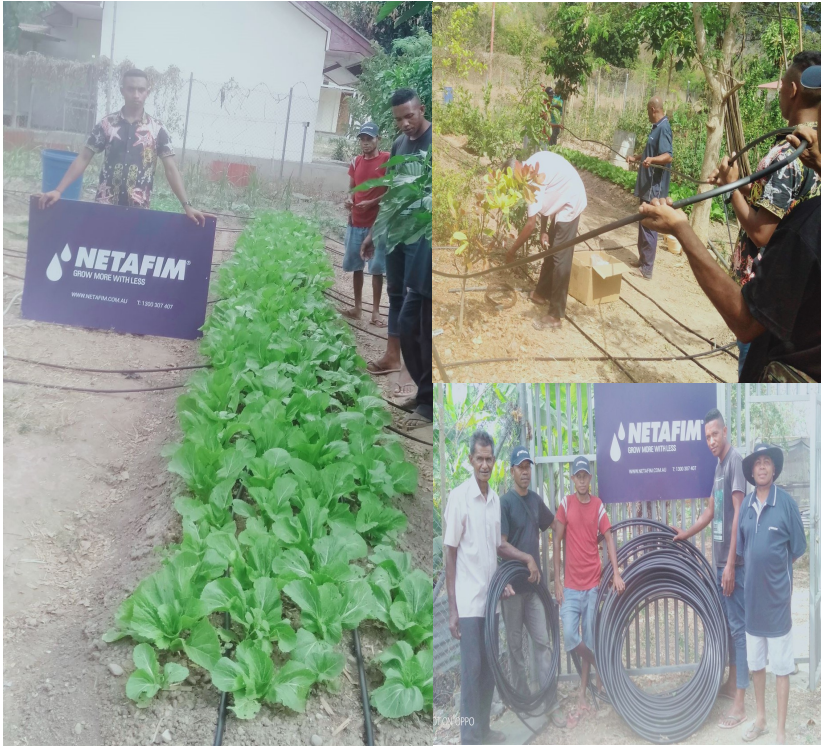
NZ-Aihan Diak be Moris Diak
Klbur Domin received a grant from the NZ Embassy in Dili to improve self sufficiency and sustainability Kilbur Domin and was one of very few organizations to receive a grant in this program. Klibur Domin received $22,800 USD. With additional funds provided by Ryder Cheshire New Zealand and Ryder– Cheshire Victoria and in-kind donations the total funds for this program are around $40.000 USD. Kilibur Domin currently prepares over 300 meals a week and this is a major expense.
Funds were used to extend the vegetable gardens and orchards already in existence and add livestock (cattle, pigs, goats, ducks and chickens) to the Klibur Domin site. This program ran for 12 months By growing vegetables and fruit, collecting eggs and grazing animals, KD was looking to reduce the cost of feeding residents. by 30% in the next year. To improve the nutrition of patients on their return home, Klibur Domin hopes to teach inpatients and carers new food production skills.
The training provides information and hands-on experience for inpatients and families in livestock selection and care and vegetable and fruit production.
This includes:
• Preparing and improving soil
• Preparing and planting seedling and fruit trees
• Constructing shelters for livestock
• The selection and procuring the livestock
Children’s Playground
The final components to the two sets of playground equipment, donated by Mount Gambier and Whitehorse Councils, have been tested out by children of family members visiting or staying at Klibur Domin for various reasons.
Apart from the swings and climbing structures, a large trampoline has been erected as well as some shade sails. This project has been an initiative of St Josephs School in Melbourne, helped by a SUBSTANTIAL discount from VULY PLAY for the trampoline, and some private donations.
Solar Project
Klibur Domin currently spends over $11,000 USD per year on electricity and generator fuel. Grid power remains highly unreliable at our centre’s location in Tibar and generator back up power accounts for one third of total electricity cost. This is both disruptive and costly and any increase in electricity or diesel fuel prices, or a generator breakdown, are serious risks to the organisation.
A large solar installation was therefore identified as a highly logical investment that will significantly reduce this burden on the centre’s operational costs while making an important statement about our commitment to sustainability goals and corporate social responsibility.
The decision was made to build an overhead system on a new structure which will be approximately 300 square meters when completed, and will include car parking for staff and visitors. This relocation of vehicles as well as other components of KDs electrical system has opened up other areas within the compound for redevelopment into a safer, more friendly social space.
The project consist of approximately 35 kW of solar panels and sufficient battery storage to ensure that all excess capacity is able to be retained. With technological changes such as these Klibur Domin will reduce emissions for a more sustainable future.
